Selecting the appropriate eCommerce platform is of utmost importance when it comes to establishing, monitoring, and sustaining an online store. This decision has the potential to determine the success or failure of your business in the long run. This aspect holds even greater significance for small enterprises due to their limited financial resources and available assets.
Magento vs Shopify vs Woocommerce is a leading platform in the eCommerce industry, and each platform offers distinct features along with its own set of advantages and disadvantages. In this comprehensive analysis, the BSS Commerce blog will provide you with all the necessary information regarding these platforms, enabling you to make an informed choice that aligns perfectly with your business requirements.
Magento vs Shopify vs Woocommerce: Brief Explanation for Each Platform
Table of Contents
Overview of Magento
Adobe Commerce, previously recognized as Magento, is a versatile and expandable commerce platform that empowers you to establish customized B2B and B2C experiences. Its purpose is to assist enterprises of various scales in constructing and monitoring their online stores, enhancing their progress, and providing flawless customer purchasing experiences.

Magento provides a comprehensive range of features, encompassing catalog management, payment processing, and order fulfillment. This allows businesses to swiftly create new website content, establish product recommendations, and seamlessly integrate both B2B and B2C solutions within a single platform. Its exceptional performance has earned it prestigious recognition as a leader in the 2023 Gartner® Magic QuadrantTM for digital commerce.
Dig deeper into Magento features and how to build a Magento store in this post: What Is Magento Ecommerce and All You Need to Know About It
Who Should Use the Magento Platform?
- Medium-Sized and Enterprise-Level Businesses: Magento is best suited to businesses with large websites and a budget for development. It’s capable of handling large volumes of data and transactions.
- Experienced Developers: It’s a complex platform that offers a high degree of customization, so having technical expertise can help in leveraging its full potential.
- Businesses with Diverse Needs: Magento works well for businesses that manage multiple brands, multiple websites, multiple currencies, and multiple languages, all from one admin panel.
- Businesses Seeking Scalability: Magento is a scalable solution, making it a good choice for businesses that anticipate growth and need a platform that can grow with them.
- Businesses Needing B2B Features: If you want to sell products to retailers, you can use the Adobe Commerce B2B module and provide features like individual price lists, select different payment options, and add authorizations.
Pros and Cons of Magento (Adobe Commerce)
Pros
- Flexible, scalable, and agile. The ability to manage all brands across all countries with one cloud solution that allows for rapid scaling as needed.
- Extended capabilities. With Magento, you may access some of the world’s greatest technologies and extend your capabilities to fit your specific business needs, such as introducing new payment services, marketing services, or integrating with a CRM.
- Support for multiple business models. Magento is an ideal option for B2B businesses who also want to sell direct to consumers; you can accomplish both from one platform.
- Limitless frontend flexibility. Magento provides a robust backend, efficient APIs, and a decoupled frontend in PWA Studio for flexible commerce experiences. It supports responsive websites, progressive web applications, robust CMS integration, and custom digital touchpoints.
Cons
- Requires technical skills. To fully leverage the capabilities of Magento, development skills are required. It’s a complex platform that offers a high degree of customization, so having technical expertise can help in leveraging its full potential.
- Hosting. Hosting is necessary for Magento, unlike other platforms, and it comes with an additional cost.
Here is the comparison between 2 editions of Magento: Magento community vs enterprise
Overview of Shopify
Shopify, a widely used eCommerce website builder, provides flexible monthly and annual plans to suit various budgets. This comprehensive platform equips you with all the necessary tools to effortlessly launch an online store, regardless of your coding or design expertise.

With every Shopify plan, you enjoy unlimited storage, unlimited bandwidth, and the ability to showcase an unlimited number of products. This ensures that Shopify seamlessly adapts to the growth of your business. Moreover, the user friendly interface allows you to create a fully functional Shopify store that is optimized for search engine visibility within a matter of hours.
Who Should Use the Shopify Platform?
- Shopify is particularly well-suited for businesses that focus on selling products rather than services due to its emphasis on online sales features.
- Small businesses and startups looking for a comprehensive eCommerce platform that offers robust functionality.
- Shopify caters to multi-channel sellers by providing support for selling on various platforms such as Facebook, Instagram, Amazon, and eBay.
- Those who prioritize ease of use will find Shopify appealing, as it is renowned for its user-friendly interface that simplifies the sales process.
Pros and Cons of Shopify
Pros
- Shopify simplifies the process of launching an online store quickly with its user-friendly interface and website design tools.
- With over 8,000 app integrations, Shopify provides numerous options for customizing your site with tailored features and functionalities.
- Take advantage of Shopify’s abandoned cart recovery feature, available in every plan, to remind customers to complete their purchases.
- Whether you prefer selling online through your own Shopify store, social channels, or an online marketplace, or selling in-person at retail stores, pop-ups, or markets using Shopify POS, Shopify caters to your needs.
Cons
- Although there are no transaction fees when using Shopify Payments, for the Basic Shopify, Shopify, and Advanced Shopify plans, there will be extra fees of 2%, 1%, or 0.5% if you select a third-party payment provider.
- Shopify’s top-tier plans may be considered expensive when compared to other eCommerce website builders.
Overview of WooCommerce
WooCommerce, an open-source eCommerce plugin for WordPress, was developed in 2011 by WooThemes. It caters to the needs of small to large-sized online merchants, transforming WordPress websites into robust eCommerce sites while retaining the familiar functions of traditional WordPress.

With WooCommerce, store owners can effortlessly sell their products. Until now, there are 3.9 million online stores built using WooCommerce. It serves as an excellent option for companies seeking a cost-effective, versatile, and free solution to establish an eCommerce platform.
READ NOW the full comparison article highlighting the key difference between WordPress and Magento
Who Should Use the WooCommerce Platform?
WooCommerce is highly favored by developers and WordPress site owners who possess technical expertise due to its open-source nature, which grants unparalleled flexibility for complete customization of their eCommerce presence.
Appealing to businesses of small to medium size, as well as those with intricate eCommerce needs that demand extensive configuration options and enhanced scalability.
Pros and Cons of WooCommerce
Pros
- It’s free
- With WooCommerce, you have the flexibility to sell a wide range of products and services, including physical items, digital downloads, and various services
- Enjoy the benefits of using open-source software with WooCommerce, as it allows for unlimited possibilities in site design and functionality that closed-source software cannot offer.
- Make your online store accessible to mobile users effortlessly, ensuring a seamless shopping experience for your customers.
- Unlike other eCommerce platforms, WooCommerce does not require you to commit to long and expensive contracts, giving you the freedom to adapt and grow your online business as needed.
- WooCommerce is specifically designed for use with WordPress websites, the most widely used content management system globally, ensuring compatibility and ease of use
Cons
- WooCommerce may not be the best option for beginners as it has a steep learning curve, especially for those who are not familiar with WordPress. This can make it challenging for novice or less tech-savvy website builders
- Regular updates are necessary to maintain the security and smooth functioning of your WooCommerce platform
- WooCommerce can only be used with self-hosted WordPress websites, which means you will need to invest in separate hosting services
- Unlike some other eCommerce platforms, WooCommerce does not provide email and phone support
So the full overview of Woocommerce vs Magento vs Shopify is clearly explained. In the section below, BSS Commerce will provide a detailed comparison between these platforms for the following criteria: pricing, themes, eCommerce features, SEO, integrations, and more.
Check out our other comparison blog posts to gain more useful insights about Magento and other platforms:
Magento vs Shopify vs Woocommerce: Full Comparison
#1. Pricing
Magento Pricing
Adobe Commerce, formerly known as Magento, offers two major plans: Commerce Pro and Managed Services; however, you will need to receive an estimate from them directly.
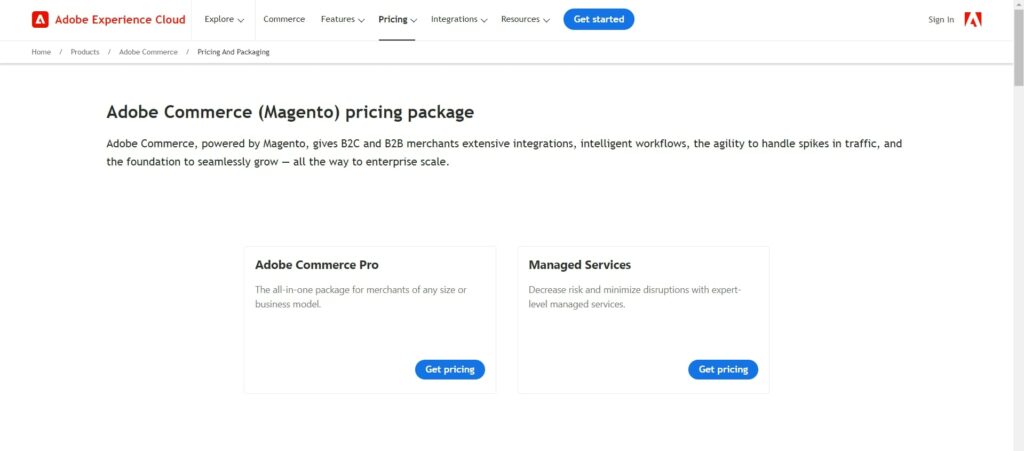
- All-in-one package Commerce Pro is made for companies of all sizes. Users have the flexibility to personalize their website and utilize the Adobe Commerce application, along with its robust security features and cloud infrastructure.
- Managed Services is a cloud-based technology service that gives users access to customer success engineers and advanced support engineers, among other specialized professional resources.
Shopify Pricing
All Shopify plans offer the opportunity to create an online store. Although Shopify provides cost-effective pricing plans for businesses of various sizes, the features they offer are tailored to suit different types of companies. Here are the specific prices for each plan:
- The Basic plan costs $19 per month
- The Shopify plan costs $49 per month
- The Advanced plan costs $299 per month

Furthermore, you can enjoy the benefits of Shopify with a complimentary 3-day trial, and no credit card is required. After the trial period ends, you can choose a suitable plan that matches the scale and growth of your business.
WooCommerce Pricing
The WooCommerce plug-in may be free, but that doesn’t mean you can create an e-commerce website with WooCommerce without incurring any costs. You will need to register a domain and purchase website hosting services for your WordPress site if you don’t yet have a self-hosted WordPress website. For a domain, you can expect to pay about $15 per year for each domain name you use., while WordPress hosting can be as little as $3.99 per month and as high as $5,000.
In addition to these costs, there are other expenses you should consider. The cost of a WooCommerce theme can range from $0 to $99 annually. Payment gateway costs vary depending on the provider. Third-party integrations and extensions vary depending on the types of integrations you choose to add to your site.
If you require the assistance of a WooCommerce developer, you should be prepared to pay per hour for their services. Depending on the complexity of your project, these costs can add up to thousands of dollars.
The Final Verdict: When it comes to Magento vs WooCommerce vs Shopify pricing comparison, it can be claimed that WooCommerce tends to be the most cost-effective option, especially for small businesses or startups. Shopify offers a more predictable pricing structure, which some businesses may prefer. Magento can be the most expensive, particularly for its enterprise solution, but it also offers a robust set of features that may justify the cost for larger businesses.
#2. Site Performance and Scalability
Magento Site Performance and Scalability
Magento 2.0 introduces a comprehensive range of enhancements in performance and scalability, which include:
- Streamlining web page delivery for faster loading times
- Improving server response time for all website functions
- Enhancing efficiency for backend tasks
- Expanding database flexibility and scalability to handle high-traffic demands
Shopify Site Performance and Scalability
Shopify excels in terms of website speed and performance. However, as your store grows, you may encounter challenges with Shopify’s scalability. To make sure smooth and seamless scalability, it is recommended to explore the benefits of using Shopify Plus.
WooCommerce Site Performance and Scalability
WooCommerce offers scalability, however, individuals lacking proficient coding skills may encounter difficulties when attempting to scale their online store sites to meet their specific requirements.
The Final Verdict: The comparison of Magento vs Shopify vs WooCommerce for site performance and scalability largely depends on the specific needs and resources of the business. Magento is a good choice for large-scale businesses, Shopify is suitable for businesses seeking an easy setup and reliable hosting, and WooCommerce is a viable option for those with coding knowledge looking to build a scalable online store.
#3. Themes and Templates
Magento Themes
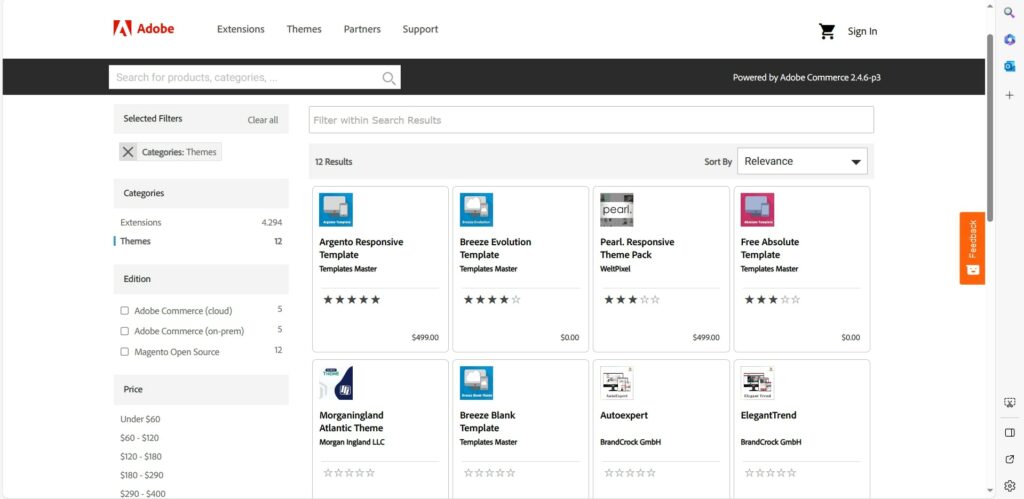
Magento (Adobe Commerce) places a strong emphasis on allowing users a wide range of options for customization and flexibility. This is achieved through the implementation of a user-friendly drag-and-drop builder, which is complemented by 12 themes and a seamless personalization editor. In addition, the platform offers an extensive collection of plugins and add-ons, enabling users to have complete control over every aspect of their website. Whether it involves creating a captivating landing page, efficiently managing inventory, or expanding their online business, users can rely on Magento (Adobe Commerce) to meet their needs.
Also, Magento provides responsive themes that dynamically adapt the page layout to suit the viewport of the device being used. This guarantees a smooth and uninterrupted shopping experience for customers, regardless of the device they are using.
Shopify Themes

The Shopify Themes store provides a wide selection of over 170 options, which consist of 12 free themes and over 160 premium themes. If you prefer premium choices, their prices range from $140 to $400. When investing in these expertly crafted templates, you gain the benefit of effortless customization and a vast array of content. Also, these premium options come equipped with built-in features that boost customer engagement and streamline the process of generating sales.
WooCommerce Themes

The WooCommerce Themes Store provides customers with a wide range of 84 themes, all meticulously crafted by skilled developers. This guarantees that every theme is dependable and operates at its peak performance.
The Final Verdict: Shopify is a better option compared to Magento and WooCommerce because this platform provides a full-free and premium theme, an unlimited free trial, and support for constant updates with flexible eCommerce features to cater to the needs of marketing strategies for online businesses.
#4. eCommerce Features
Magento eCommerce Features
Magento offers an extensive range of pre-built functionalities. It allows businesses to develop exceptional B2C and B2B shopping experiences while benefiting from a wide array of extensions and third-party integrations available in the marketplace. This enables limitless customization options for eCommerce ventures. And here are specific features:
- Sell Anywhere. Customers can shop whenever, anywhere, and however they want with Adobe. Connecting shopping experiences across channels is simple, as is adding new brands and sites and expanding into new geographies.
- Manage and Deliver. Adobe Commerce enables you to customize browsing and purchase experiences at scale by providing tailored promos, omnichannel fulfillment choices, and self-service simplicity.
- Scale, Extend, and Support. Get the control and flexibility to innovate and scale without sacrificing security. With certified global integrators and a wide array of support resources, you can also reduce technical overhead while driving high-value commerce experiences.
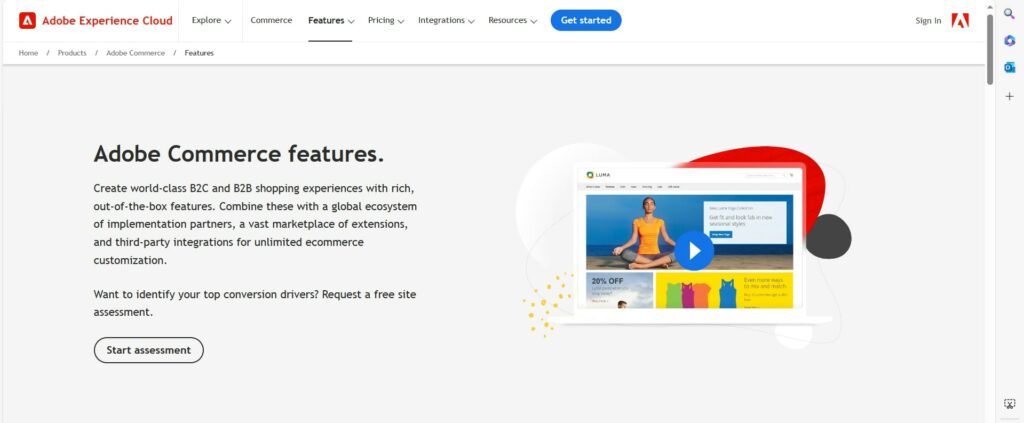
Shopify eCommerce Features
- Online Storefront: Shopify provides an online store editor to build your site by choosing a theme, making it easy to create an optimized eCommerce experience. It also offers free industry-specific templates that you can easily customize without needing to code
- Checkout: Shopify Checkout is reliable, lightning-fast, and built to maximize conversion
- Shipping: Shopify Shipping allows you to send your orders faster and for less with one easy shipping solution
- Point of Sale (POS): Shopify POS allows merchants to sell in person and stay seamlessly connected to their online business
- Order Management and Fulfillment: Shopify Fulfillment Network streamlines your order fulfillment, returns, and product storage
- Custom Storefronts: Customize your store to win customers, build loyalty, and boost sales
- Metafields: Extend Shopify with custom fields tailored to your business
- Liquid: Use Shopify’s open-source programming language to customize your store, or integrate microservices
- Multiple Payment Options: Shopify supports a variety of payment options
- Order Tracking: Shopify provides order-tracking features
- Customer Support and Chatbots: Shopify offers customer support and chatbot features
WooCommerce eCommerce Features
- Flexible eCommerce: WooCommerce offers next-level flexibility and customization for established businesses.
- Store Setup: It provides options for homepage design, menus, site structure, and payment and shipping options.
- Payment Options: WooCommerce comes bundled with the ability to accept major credit cards, bank transfers (BACS), checks, and cash on delivery.
- Order Management: Built on WordPress, the WooCommerce dashboard is a familiar interface for store managers to update products and fulfill orders.
- Customization: Developers can use WooCommerce to create, customize, and scale a store to meet a client’s exact specifications.
- Extensions: The WooCommerce Marketplace has hundreds of free and paid extensions that add features and functionality to your store.
- Support: Extensive documentation allows you to use WooCommerce products, and a public support forum can assist with questions.
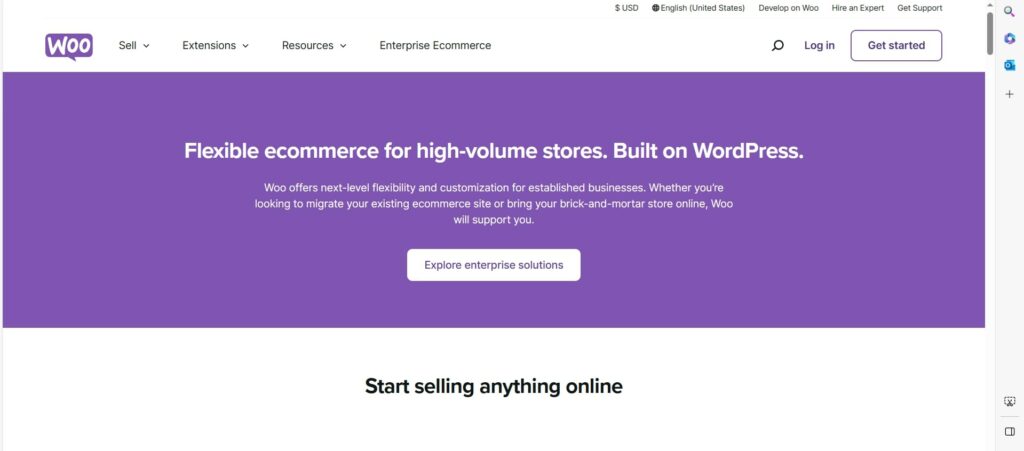
The Final Verdict: In the comparison between Magento vs Shopify vs WooCommerce, Magento is good for larger businesses that require substantial customization, Shopify is ideal for those looking for an all-in-one solution, and WooCommerce is ideal for those who want to combine an online store with their existing WordPress site. It is critical to examine each platform to ensure that it is compatible with your business goals and brand aesthetics.
#5. SEO Features
Magento SEO
Search engine optimization (SEO) involves optimizing the content and layout of a website to enhance its visibility and ranking on search engine result pages. Magento offers several features to support SEO, including:
- Adobe Commerce provides the capability to incorporate and enrich metadata with relevant keywords for your website and online store.
- The URL Rewrite tool allows you to modify the URLs associated with your products, categories, or CMS pages.
- Using a sitemap to improve the indexing of your online store by search engines, this tool can be customized to include all pages and images on your site.
- Magento provides configuration settings that enable you to generate and manage instructions for web crawlers and bots that index your site. This allows you to have more control over how search engines interact with and index your website.
Shopify SEO
Compared to WooCommerce and Magento, Shopify offers users the capability to customize title tags, meta descriptions, and URLs for various types of content, such as blog posts, webpages, products, and more. It is important to note that Shopify sites generally load faster than WooCommerce sites, which can greatly improve your site’s visibility and ranking on Google.
WooCommerce SEO
WooCommerce is a standout platform due to its SEO-optimized code and seamless integration with WordPress. It offers a diverse range of SEO plugins, enabling users to optimize their websites effectively. Through incorporating detailed meta descriptions and titles, WooCommerce facilitates clear communication of page content to Google. Consequently, choosing WooCommerce is highly recommended for individuals aiming to improve their Google ranking.
The Final Verdict: Shopify vs WooCommerce vs Magento: these three platforms are all ideal options for improving the SEO features of online stores.
#6. Plugins and Extensions
Magento Extensions
You have the opportunity to enhance the capabilities of your online store effortlessly by utilizing a wide range of complimentary and premium extensions and themes available on the Adobe Commerce Marketplace. These Magento modules are categorized into various sections such as Customer Support, Payments & Security, Marketing, Accounting & Finance, Shipping & Fulfillment, Site Optimization, and more, enabling you to conveniently navigate through the available options.
Shopify Apps

Compared to WooCommerce and Adobe Commerce, the Shopify App Store boasts an extensive selection of more than 8,000 apps. Prior to being featured on the Shopify App Store, each application undergoes a meticulous review process consisting of 100 checkpoints. It can be claimed that there are many exceptional Shopify apps that play a pivotal role in augmenting sales optimization and simplifying order fulfillment procedures.
WooCommerce Plugins
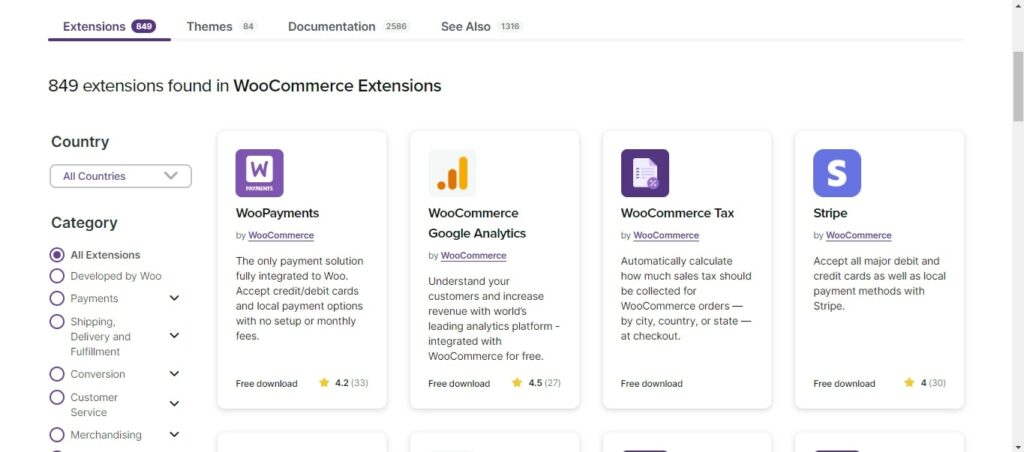
There are 849 available extensions for WooCommerce sites, with 71 of them being exclusively developed by WooCommerce.
The Final Verdict: WooCommerce stands out from Shopify and Magento when it comes to apps and plugins. As open-source software, WooCommerce relies on plugins to offer a wide array of features. What sets WooCommerce apart is its unique ability to function as both software and a plugin, resulting in enhanced performance.
#7. Payment Gateways
Magento Payment Gateways
- Accept and Process Payment Methods Effortlessly: Adobe merchants can easily accept a wide range of popular payment methods, such as credit and debit cards, PayPal, Venmo, PayPal Pay Later, and Apple Pay.
- Seamless Integration for a Complete Payment Experience: Payment services provide a fully integrated experience for merchants, allowing them to access all payment and transaction data directly within the Adobe Commerce Admin.
- Competitive Fees for Convenient Transactions: This ensures that they have access to convenient and cost-effective payment processing.
- Comprehensive Financial Reporting: Easy to track processed volume and payment balance, and even access transaction-level reporting for financial reconciliation.
- Up-to-date and Secure Services: As Payment services are developed and supported by Adobe, merchants can rest assured that they have access to services that are always up-to-date, secure, and stable.
Shopify Payment Gateways

Shopify, being a well-established eCommerce platform, provides a wide range of payment options to meet the requirements of your customers. With an extensive collection of over 100 payment gateways, it offers popular choices such as PayPal, Stripe, Amazon Pay, Square, and numerous others.
WooCommerce Payment Gateways
WooCommerce provides a notable benefit compared to Shopify as it does not enforce transaction fees when using a third-party payment gateway. Nevertheless, it is crucial to acknowledge that bank charges and fees from payment providers, like PayPal, will still apply. If your intention is to grow your store and sell a considerable amount of products, opting for WooCommerce would be a more rational decision than Shopify or WooCommerce.
The Final Verdict: WooCommerce stands out in this scenario due to its distinct advantage of offering more favorable transaction fees and a wider range of payment options. In contrast to Magento and Shopify, WooCommerce does not burden you with transaction fees. If you opt for Shopify, you will end up spending more unless you utilize Shopify Payments. This key difference gives WooCommerce the upper hand and makes it the superior choice for businesses dealing with high volumes of product sales.
#8. Security
Magento Security
Magento provides a wide range of security features to ensure the safety of your eCommerce store. It offers two-factor authentication, which adds an additional layer of protection. To prevent bots from accessing your store, you can implement CAPTCHA or reCAPTCHA. Magento also allows you to conduct security scans for each domain in your installation, enabling you to identify any potential security risks or malware. Additionally, the Adobe Managed Services team offers essential security services such as compliance, logging, authentication, scanning, monitoring, and server security. Furthermore, Magento consistently releases security updates to address any vulnerabilities that may arise.
Shopify Security
With Shopify, you can have peace of mind knowing that security is effectively handled. As a hosted eCommerce platform, Shopify assumes the responsibility of dealing with any security breaches and safeguarding your website from hackers. While it may not include member areas, it does offer strong password protection for your customers’ login credentials.
WooCommerce Security
WooCommerce seamlessly integrates with WordPress, distinguishing it as a self-hosted platform. Although WooCommerce offers some security measures, it is your responsibility to choose and implement the necessary tools to bolster your website’s security. Consequently, you must either personally oversee the security or entrust it to your hosting provider.
The Final Verdict: Both Magento vs Shopify vs WooCommerce provide safety and security features to make sure that they can provide high-level security for users and prevent leaks of data and information from customers.
#9. Customer Support
Magento Customer Support
Magento offers a vast global community that stands ready to assist merchants in overcoming any challenges they may encounter. Within this community, developers and seasoned store owners offer valuable advice and guidance. Additionally, Magento provides a comprehensive help center and knowledge base to cater to the needs of its customers.
Another option to search for customer support is contacting a Magento agency. From Magento 2 development service, Magento integration services to Magento migration service, BSS Commerce will comprehensively optimize your eCommerce store performance, unlocking its significant sales growth.
Shopify Customer Support
Shopify is renowned for its exceptional customer support, accessible even before you subscribe to a particular plan. The support Shopify team is at your service 24/7, reachable via phone, email, and instant messaging.
Furthermore, Shopify offers extensive documentation, a comprehensive knowledge base, and a thriving community for developers and users alike. Additionally, if you require assistance or wish to integrate a third-party solution, you have the option to hire Shopify experts.
WooCommerce Customer Support
WooCommerce is a free and open-source solution with a significant user base and community. WooCommerce users can get help or technical support from a community of WooExperts and developers. Small businesses will greatly benefit from this because they may not have the funds to engage a professional developer. Similar to Shopify, WooCommerce provides online documentation, tutorials, and reference.
The Final Verdict: In terms of customer service, Magento vs WooCommerce vs Shopify have a large community of users and dedicated experts that you can learn from and apply to your online business.
Magento vs Shopify vs Woocommerce: Wrapping Up
To sum up, when it comes to comparing Magento vs Shopify vs WooCommerce, the question of which one is better is often questioned. As is often the case with such inquiries, the answer is not straightforward. Choosing the right eCommerce platform involves taking various factors into account, such as your technical skills, budget, store size, and required features, among others. However, there are three scenarios where the answer becomes clear:
- If you have a substantial budget and desire a powerful solution to launch a large-scale enterprise shop, Magento is the most suitable option.
- If you lack technical skills and are seeking a fast and hassle-free way to create your online store, Shopify is the optimal choice for you.
- If you are willing to learn and prefer a platform that can adapt and expand alongside your business without limiting its potential, WooCommerce is the ideal platform for you.
If you find yourself not fitting neatly into any of those three platforms, WooCommerce is an excellent starting point. As mentioned above, it is worth considering thanks to its simplicity, cost, and versatility. If you have experience with WordPress, learning WooCommerce and setting up an online store should be a breeze. Even if you’re new to WordPress, it is much more user-friendly than Magento or Shopify, and there are plenty of helpful resources available. Additionally, you could explore other Magento competitors to choose the most suitable platform for your business.
Hope that this blog about the full comparison between Shopify vs Magento vs WooCommerce is useful for you in picking the right platform to cater to the needs of your business. In addition, you can visit the BSS Commerce website to explore the most information and knowledge about eCommerce development services.


